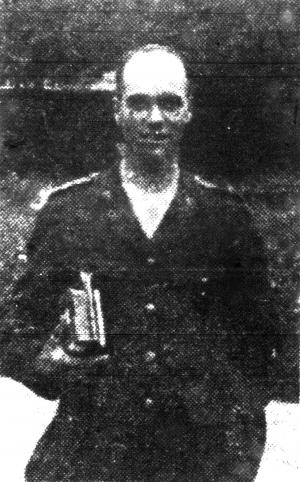BX August 10, 1917
Paris Flyer Now A Prisoner – Lieutenant Henry Cotton, R.F.C. Captured When Engine was Shot Away
(From Our Own Correspondent)
PARIS, Aug. 10 – Mrs. A. Cotton has received the following letter from her son, Lieut. Henry Cotton, of the Royal Flying Corps., who is a prisoner in Germany. At the time of his enlistment he was in the Methodist ministry, and had been stationed at Waterford, Delhi and other places. He was taken prisoner on May 27, brought down 16 miles over the line, at an altitude of 15,000 feet. Engine and controls were shot away. He was wounded in the head and it seems to be a miracle he escaped.
My Dear Mother and Sisters,
Will be glad to hear that I am quite safe and am being treated splendidly by the Germans. They have done all they possibly could to make us comfortable. Karlsruhe is a lovely city. We are in the centre and live in huts. Everything is done to make life pleasant. Our surroundings are kept quite clean. There are a good number of Canadian officers here. I want you to let Rev. N.A. Hurlburt of Delhi, know I am safe, also Mr. Wells and other friends. Parcels containing the following articles will be very acceptable. Dried bread crumbs (for pudding); dried fruit, (figs, raisins, prunes, apples, etc.), rice, hard cheese, treacle, tinned meats and fish, in fact any tinned goods. Glass goods will break. Parcels must not exceed ten pounds, must be well packed and without postage. Kriegsgefangener means prisoner-of-war camp. I am allowed to receive as many parcels as my friends care to send and also letters which must be written plainly and not more than four pages. Don’t put too much in the parcels and don’t send too many unless you hear further. Will let you know how I was shot down. It was an impossible job they gave us to do. The whole formation was shot down. I shall be quite safe here and with the help of parcels shall be quite comfortable until the war ends. The climate here at present is identical with the
Canadian weather. Winnie will send me all the clothes I need. We may be moved from camp to camp, but letters and parcels will always follow. The Germans are really very kind to us and help us in every possible way. There are as many prisoners here that the mail is necessarily limited to two letters and four post cards per month. Don’t worry.
Lieut. H. Cotton, R.F.C.
Officer – Kriegsgefangener
Karlsruhe, Germany

